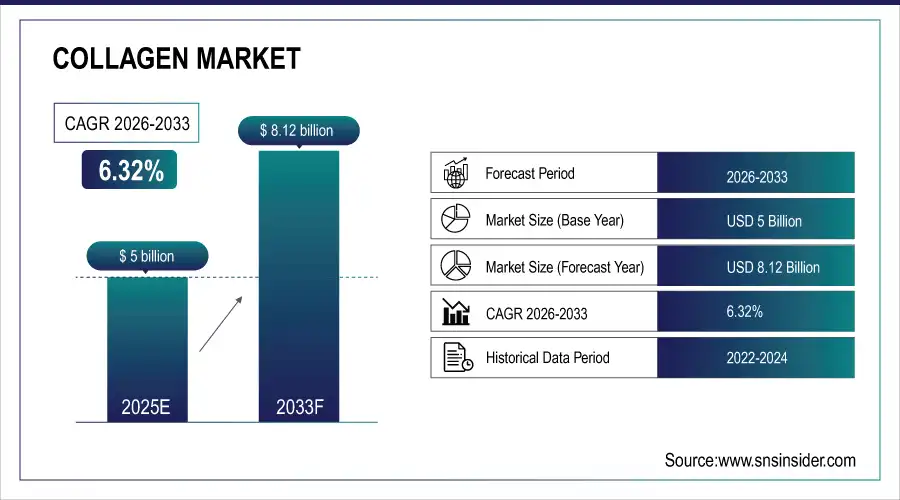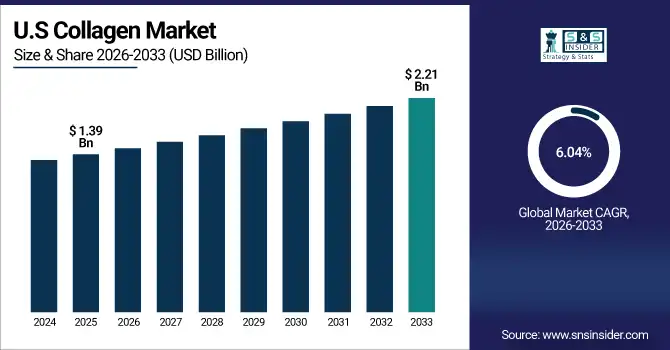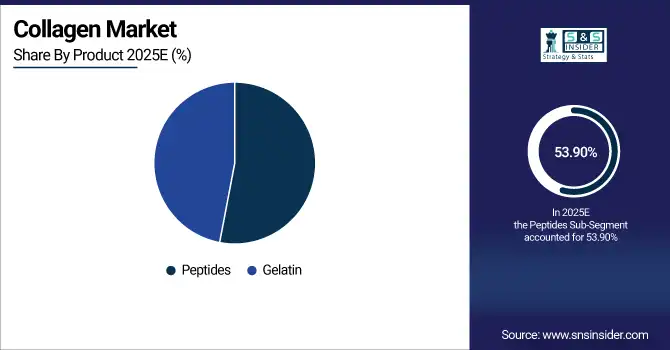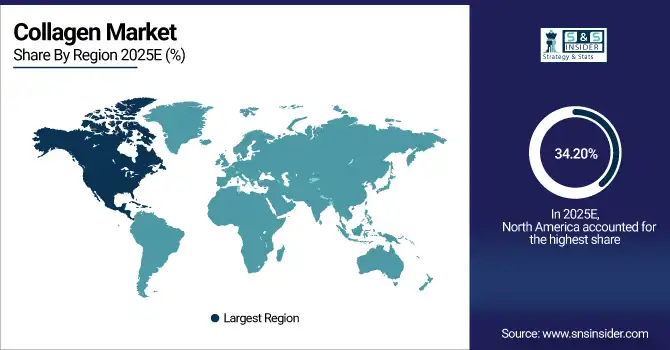Collagen Market Report Scope & Overview:
The Collagen Market size was valued at USD 5 Billion in 2025E and is projected to reach USD 8.12 Billion by 2033, growing at a CAGR of 6.32% during 2026-2033.
The global market expansion is fueled by the changing consumer trend towards health and wellness, rise in demand for anti-aging products as well as cosmetic products, and surging penetration of nutraceuticals and functional foods across the globe. The growing adoption of collagen in food and beverages together with innovations in collagen-based formulations is also expected to enhance the growth of the market as the demand for collagen in personal care is also rising. Strong domestic growth is also supported by growing awareness of joint, skin and hair health benefits.
Over 60% of consumers globally actively incorporate dietary supplements into their daily routine for overall wellness.
Market Size and Forecast:
-
Market Size in 2025: USD 5 Billion
-
Market Size by 2033: USD 8.12 Billion
-
CAGR: 6.32% from 2026 to 2033
-
Base Year: 2025
-
Forecast Period: 2026–2033
-
Historical Data: 2022–2024

To get more information on Collagen Market - Request Sample Report
Collagen Market Trends
-
Rising consumption of collagen in sports nutrition and protein supplements is driving overall market growth.
-
Collagen supports muscle recovery, joint flexibility, and performance, making it popular among athletes and fitness enthusiasts.
-
Manufacturers are launching convenient collagen products, including powders, bars, and ready-to-drink formulations, boosting adoption.
-
Increasing health awareness, gym memberships, and preference for natural dietary supplements are strengthening demand.
-
Growth opportunities exist in functional foods and nutraceuticals, with consumers seeking skin, joint, and overall wellness benefits.
-
Collaborations with food and beverage companies and e-commerce distribution channels are expanding market visibility and reach.
U.S. Collagen Market Insights
The U.S. Collagen Market size was valued at USD 1.39 Billion in 2025E and is projected to reach USD 2.21 Billion by 2033, growing at a CAGR of 6.04% during 2026-2033. The U.S. market growth is mainly driven by the rising awareness towards healthy aging and preventive healthcare, and the increasing adoption of collagen-based supplements and functional foods. In addition, the rising demand for cosmetic and personal care products along with the growing fitness and sports nutrition industry will be supportive of the market growth. The rising number of joint, skin, and hair health consumers is applying higher collagen use in a range of applications in average over U.S.

Collagen Market Growth Drivers:
-
Growing demand for anti-aging products fuels collagen market growth, as collagen is vital for skin elasticity and joint health.
The increasing demand for anti-aging products is highly driving the collagen market, primarily due to its crucial role in maintaining the elasticity of the skin and healthy joints. Natural collagen production decreases with age, which leads to wrinkles, sagging skin, and reduced flexibility of joints in aged persons. This factor has driven a large change in consumers and led them towards collagen-based products to prevent such conditions. For instance, beauty big guns such as Vital Proteins and Neocell have taken the opportunity to create formulations of collagen supplements or skincare products claimed to firm up and reduce wrinkles. Likewise, better versions of hydrolyzed collagen are absorbed better into the body, which makes it very popular for use in the wellness sector in the sense of persons who wish to achieve a higher degree of anti-aging. Clinical studies have shown well the efficacy of collagen in supporting skin hydration and elasticity, further bolstering consumer confidence and growth in the market. Moreover, the incorporation of collagen in innovative product formats such as collagen-infused beverages and topical creams is evidence of the versatility of the market in responding to consumer exigencies for easy and multifunctional antiaging solutions. This increased demand reflects a rise in attention toward proactive health and beauty regimens wherein collagen has come to the fore as an essential element of the pursuit of youthful skin and a life of general wellness.
-
Increased awareness of collagen’s benefits for skin, joints, and overall health boosts consumer interest and product adoption.
Growing awareness of the flexibility of collagen benefits for the skin, joints, and overall health has greatly accelerated consumer adoption and interest in collagen-based product usage. Currently, greater numbers of consumers are more aware of the importance of collagen to the elasticity of skin, flexibility of joints, and general health, which has acted as a catalyst for shifting towards adding collagen to one's daily health regimens. This increased awareness is propelled by the synergistic effects of scientific research, prominent media coverage, and endorsements from health and wellness experts. For example, numerous studies have demonstrated how collagen supplementation can hydrate the skin as well as reduce pain and tenderness in joints; thus, consumer confidence is instilled in spending money on such products. The rapid increase in the number of digital health influencers and wellness blogs further amplified this trend by sharing personal testimonials and evidence of the positive impacts of collagen, making its benefits more accessible and relatable to a broader audience. This has been another reason why brands such as Sports Research and Great Lakes Wellness have reaped the benefits of that heightened awareness, as they came out with a variety of collagen products powders, and capsules to protein bars-so many different consumer preferences and requirements. Expansion of product offerings and the emphasis on clarity of origin of ingredients and the benefits also encouraged consumer adoption as consumers are seeking products that align with their health goals and lifestyle. Such awareness and availability of the product also reflect a preventive approach toward health and holistic wellness and position collagen as an important player in modern health and beauty markets.
Collagen Market Restraints:
-
Premium pricing of high-quality collagen supplements can limit accessibility and affordability for a broader consumer base.
Premium prices of high-quality collagen supplements would be less accessible and unaffordable to most consumers, making them less attractive to a greater portion of this target market. Production costs and the guarantee of quality make high-quality collagen products more advanced formulations or premium raw materials excessively pricey. For instance, grass-fed bovine collagen powders, or even marine collagen, usually are more expensive than regular ones, therefore budget-conscious consumers might not afford them. This will result in low penetration because cost-pressured consumers will opt for cheaper options or avoid collagen supplements altogether. Thus, although the products of excellent collagen are in demand by the companies that can pay for it, the premium price becomes an important deterrent through the exclusion of its wider use among people who will be helped by these supplements but cannot afford them.
Collagen Market Opportunities:
-
Expanding use of collagen in functional foods, cosmetics, and medical devices presents opportunities for market expansion and product diversification.
The increasing adoption of collagen in functional foods, cosmetics, and medical devices thereby provides opportunities for increased market size and variety of products. Increased awareness of the health and beauty benefits of using collagen means the element is more widely integrated into a wide range of products. In functional foods, collagen is added in protein bars, beverages, and snack items that allow consumers to conveniently consume the essential protein. Cosmetic products contain collagen as it has its own anti-aging and rejuvenating properties to help people rejuvenate their skins through anti-aging creams, serums, and masks, while application in medicine is also extended into innovative uses such as wound dressings, and tissue engineering. This diversification assists companies in accessing the new market segment, addressing the different needs of consumers, creating growth in the collagen market, and bringing newer product development avenues and innovation into the fold.
Collagen Market Segmentation Analysis
-
By Product, Peptides led the Collagen Market with a 53.90% share in 2025E, and is the fastest-growing segment with a CAGR of 6.67%.
-
By Dosage Form, the Powder sector dominated the market with 55.20% share in 2025E, whereas the Liquid segment is expected to grow fastest with a CAGR of 7.70%.
-
By Source, Bovine led the market with 43.70% share in 2025E whereas Marine is registering the fastest growth with a CAGR of 7.36%.
-
By End-User, Food held 35.40% share in 2025E, whereas Nutraceuticals sector is growing the fastest with a CAGR of 7.17%.
By Product, Peptides Leads Market and Registers Fastest Growth
Peptides held the largest revenue share within the Collagen Market in 2025E since they possess high bioavailability derivatives with extensive application in nutraceuticals, skincare, and in dietary supplements. It is well-absorbed and can be formulated into a variety of products, which is why brands and consumers prefer it. In this space, Vital Proteins LLC is a significant company, supplying collagen powders and supplements made from collagen peptides. The Peptides segment is expected to witness the fastest CAGR in terms of revenue during 2026-2033, owing to increasing popularity for targeted health benefits, such as joint and bone support, along with rising inclusion in functional foods, beverages, and cosmetic products.

By Dosage Form, Powder Dominate While Liquid Shows Rapid Growth
The Collagen Market was driven by the powder segment, which captured the largest revenue share of the Collagen Market in 2025E, owing to the convenience of use, an extended shelf life, and ease of incorporation in food and beverages. Powdered collagen is a common ingredient seen in supplements and protein shakes and also cooking. NeoCell is a big name in the powdered collagen game, securing beauty and wellness claims. Due to their high demand for ready-to-drink collagen beverages, they are predicted to grow most rapidly with a CAGR during 2026 2033 and increased bioavailability, coupled with a consumer need for convenience and on-the-go nutrition solutions, further driving growth for this segment.
By Source, Bovine Lead While Marine Registers Fastest Growth
Bovine was the highest revenue-generating segment in Collagen Market with a 2025E market share owing to its relatively high availability, economic viability and effectiveness in health and cosmetic applications. Gelita AG is one of the largest manufacturers of high-grade bovine collagen, providing high quality gelatin for food, nutraceutical, and personal care applications. Marine segment is expected to register the highest CAGR during 2026–2033 owing to surging consumer preference towards sustainable, premium quality, and easily absorbable collagen. Due to this association with premium products, anti-aging benefits, and cleaner sourcing, the perception of marine collagen further optimizes marine supplements among nutraceuticals and cosmetics.
By End-User, Food Sector Leads While Nutraceuticals Sector Grows Fastest
Food segment is dominating in Collagen Market share in 2025E, it is highly used in functional foods, drinks, and cooking. There is a growing consumer demand for collagen-based food products as nutritional supplements to improve wellbeing and reduce signs of aging. Nestlé Health Science has been one of the leading companies in this respect designing collagen enriched nutrition products. Due to growing awareness of the health benefits of nutraceuticals, increased population of elderly, and greater demand for supplements targeting joint, skin, and hair health, the nutraceuticals segment is estimated to offer lucrative growth opportunities and is predicted to exhibit the fastest CAGR (2026–2033). The rapid uptake in nutraceutical applications is backed by product innovations in capsules, powders, and functional beverages.
Collagen Market Regional Analysis:
North America Collagen Market Insights
North America accounted for the largest revenue share of approximately over 34.20% in 2025E, owing to high health consciousness among consumers, a mature supplementary market and a well-established cosmetic industry. Consumer demand towards anti-aging products and functional foods is one of the factors contributing to the growth of the market in the region; in both men and women, collagen-based supplements and personal care products are driving greater demand to support skin, hair, and joint health.

To Get Customized Report as per your Business Requirement - Request For Customized Report
U.S. Collagen Market Insights
The U.S. is a leading country in the collagen market across North America, owing to high consumer cognizance regarding health and wellness, a mature dietary supplements and cosmetics industry, extensive penetration of anti-aging products in the region and increasing demand for functional foods and collagen-fortified personal-care products.
Asia-Pacific Collagen Market Insights
The Asia Pacific segment is expected to grow with the fastest CAGR of around 7.35% during 2026-2033 due to rising disposable income, increasing urbanization, and a population inclined towards health. The growing sectors of nutraceuticals and functional food, coupled with growing awareness and presence of international collagen brands, is also driving adoption in the region, thereby presenting outstanding growth opportunity for manufacturers.
China Collagen Market Insights
China consists of huge population with rapid urbanization and increasing disposable income, growing health conscience population, increasing adoption of nutraceuticals and functional foods along with the rising awareness regarding the benefits of collagens in skin, hair, joint, and wellness applications, has become the leading country in Asia Pacific collagen market.
Europe Collagen Market Insights
Europe represents the largest regional market for collagen, primarily due to factors such as increasing demand for anti-aging products and personal care products, rising health awareness and growing production and consumption of nutraceuticals and functional foods. In countries such as Western and Central Europe, the presence of prominent manufacturers along with the launch of innovative products coupled with the high preference of consumers for high-quality bovine and marine collagen is also expected to boost the growth of the market.
Germany Collagen Market Insights
Germany emerged as the largest market for collagen in Europe due to high health and wellness awareness, a mature dietary supplement and personal care industry, high demand for anti-aging and functional food products, and the presence of major collagen manufacturers and dealers in the region.
Latin America (LATAM) and Middle East & Africa (MEA) Collagen Market Insights
Middle East & Africa and Latin America collagen markets are poised for steady growth owing to increasing health consciousness, rising disposable income, and rising demand for anti-aging, personal care and nutraceutical products. Urbanization, high interest in wellness, and wide adoption of supplements and cosmetics account for the leading per capita consumption of the UAE, Saudi Arabia, and Brazil in their geographic regions.
Collagen Market Competitive Landscape:
Gelita AG is a manufacturer and global leader of gelatin and collagen-based solutions, delivering pasteurized and high-quality products for food, pharmaceutical, and personal care industry. This brand includes ingredients such as Collactive Peptides, for joint, skin, and muscle health, and Gelita Gelatin, traditionally used in confectionery and nutritional application. With the emphasis on sustainable sourcing, launch of new products and higher demand for health-based and functional collagen products internationally, the company aims to yield promising results ahead.
-
In July 2025, Gelita introduced OPTIBAR® at IFT FIRST 2025 in Chicago. This innovative solution allows manufacturers to create sugar-free binders without compromising on taste or texture, offering an extremely high protein content and a soft, supple experience.
Vital Proteins LLC, is a collagen based nutritional health, beauty and wellness source. There are the Collagen Peptides Powder that boosts skin elasticity, benefits for hair and nails, and Collagen Water which is a ready to drink Collagen beverage. Stellar even focuses on the consumer who is 25+ and looks for clean, natural ingredients with functional formulations and consumers who seek wellness and anti-aging benefits and sells to global consumers more than ever.
-
In August 2025, Vital Proteins expanded into the ready-to-drink (RTD) market with its Collagen & Protein Shake, offering 30 grams of protein and 10 grams of collagen peptides per serving. This product aims to meet the growing consumer demand for convenient, high-protein beverages.
NeoCell is a top collagen brand with clinically proven products for skin, hair and nails, and joint health. Super Collagen+C in a drink mix merges collagen and vitamin C to improve absorbability and skin benefits, and chewable Beauty Bursts pack collagen for healthy hair, skin, and nails. NeoCell emphasizes natural ingredients and product efficacy and provides international consumers with scientifically validated products that they can trust.
-
In July 2025, NeoCell's Super Collagen Plus powder now includes hyaluronic acid, in addition to vitamin C, to support skin hydration and elasticity. Each serving delivers 12 grams of hydrolyzed collagen, aiming to promote healthy skin, hair, and nails.
Collagen Market Key Players:
-
Collagen Solutions (Collagen Type I, Collagen Type II, Collagen Type III)
-
Connoils LLC (Hydrolyzed Collagen, Collagen Peptides, Collagen Powder)
-
Crescent Biotech (Collagen Type I, Collagen Type II, Hydrolyzed Collagen)
-
Darling Ingredients (Gelatin, Collagen Hydrolysate, Bone Gelatin)
-
Ewald-Gelatine (Gelatin, Collagen Hydrolysate, Collagen Peptides)
-
Gelita AG (Gelita Collagen Peptides, Gelita Gelatin, Gelita Bioactive Collagen Peptides)
-
Gelnex (Collagen Hydrolysate, Gelatin, Collagen Peptides)
-
Junca Gelatines S.L (Gelatin, Collagen Peptides, Collagen Hydrolysate)
-
Lapi Gelatine (Gelatin, Collagen Peptides, Collagen Hydrolysate)
-
Nippi Inc. (Nippi Collagen Peptides, Nippi Gelatin, Nippi Hydrolyzed Collagen)
-
Nitta Gelatin, Inc (Collagen Peptides, Gelatin, Collagen Hydrolysate)
-
Rousselot (Rousselot Gelatin, Rousselot Collagen Peptides, Rousselot Hydrolyzed Collagen)
-
Sammy’s (Hydrolyzed Collagen, Collagen Peptides, Collagen Powder)
-
Stryker Corporation (Collagen Matrix, Collagen-based Surgical Products, Collagen Membranes)
-
TSI Group Ltd. (Collagen Peptides, Collagen Hydrolysate, Gelatin)
-
Vinh Hoan Corporation (Collagen Peptides, Collagen Hydrolysate, Gelatin)
-
Vital Proteins (Collagen Peptides, Marine Collagen, Bone Broth Collagen)
-
Weishardt (Gelatin, Collagen Peptides, Collagen Hydrolysate)
-
Youtheory (Collagen Powder, Collagen Peptides, Collagen Tablets)
-
Zein Protein (Hydrolyzed Collagen, Collagen Peptides, Collagen Powder)
| Report Attributes | Details |
|---|---|
| Market Size in 2025 | USD 5 Billion |
| Market Size by 2033 | USD 8.12 Billion |
| CAGR | CAGR of 6.32% From 2026 to 2033 |
| Base Year | 2025 |
| Forecast Period | 2026-2033 |
| Historical Data | 2022-2024 |
| Report Scope & Coverage | Market Size, Segments Analysis, Competitive Landscape, Regional Analysis, DROC & SWOT Analysis, Forecast Outlook |
| Key Segments | • By Product (Gelatin and Peptides) • By Dosage Form (Powder, Liquid, Capsule and Others) • By Source (Bovine, Porcine, Marine and Others) • By End-User (Food, Healthcare, Nutraceuticals and Personal care & cosmetics) |
| Regional Analysis/Coverage | North America (US, Canada), Europe (Germany, UK, France, Italy, Spain, Russia, Poland, Rest of Europe), Asia Pacific (China, India, Japan, South Korea, Australia, ASEAN Countries, Rest of Asia Pacific), Middle East & Africa (UAE, Saudi Arabia, Qatar, South Africa, Rest of Middle East & Africa), Latin America (Brazil, Argentina, Mexico, Colombia, Rest of Latin America). |
| Company Profiles | Gelita AG, Nitta Gelatin Inc., Rousselot Inc., PB Leiner, Weishardt International, Holista Colltech Ltd., Evonik Industries AG, Lapi Gelatine S.p.A., Collagen Matrix Inc., Vital Proteins LLC, Amway Corporation, Nestlé Health Science, Nature’s Bounty, NeoCell, Youtheory, Hunter & Gather, Heivy, Titan Biotech Ltd., Junca Gelatines S.L., and Gelnex Gelatin. |

